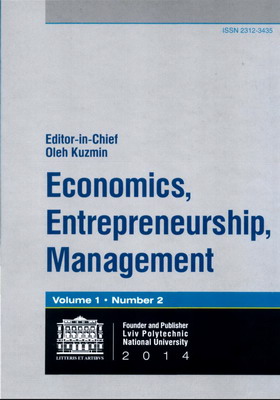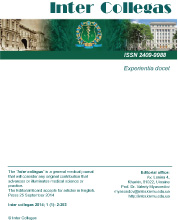
Бази даних
Наукова періодика України - результати пошуку
 |
Для швидкої роботи та реалізації всіх функціональних можливостей пошукової системи використовуйте браузер "Mozilla Firefox" |
|
|
Повнотекстовий пошук
| Знайдено в інших БД: | Реферативна база даних (5) |
Список видань за алфавітом назв: Авторський покажчик Покажчик назв публікацій  |
Пошуковий запит: (<.>A=Chernobay L$<.>) | |||
|
Загальна кількість знайдених документів : 5 Представлено документи з 1 до 5 |
|||
| 1. | 
Chernobay L. I. Expenditures algorithm formation on export activities based on economic entity involvement stages to foreign market [Електронний ресурс] / L. I. Chernobay, N. Ja. Vatsyk // Economics, entrepreneurship, management. - 2014. - Vol. 1, Num. 2. - С. 61-74. - Режим доступу: http://nbuv.gov.ua/UJRN/EEM_2014_1_2_12 | ||
| 2. | 
Chernobay L. An approach to modelling the impact of international migration on the economy of receiving country [Електронний ресурс] / L. Chernobay, V. Adamyk, S. Malibroda // Economics, entrepreneurship, management. - 2019. - Vol. 6, Num. 1. - С. 47-69. - Режим доступу: http://nbuv.gov.ua/UJRN/EEM_2019_6_1_7 Being an objective element of the global economic system, international migration produces a significant impact on the performance of individual countries nowadays. The economic impact of international migration is driven by various factors, primarily the type of international migration (labour migration, refugee migration, family migration, or student migration) and the legislation of a receiving country which determines the ability of international migrants to interact with the host country's economy and to produce the respective impact. The hypothesis of this study builds on the premise that legislation of the receiving country determines the "capabilities of migrants", that is a set of actions that can be performed by an international migrant on the territory of receiving country, the consequences of which will produce an impact on the economy of receiving country. We identified the following capabilities: the ability to enter and stay in the country; the ability to be employed; the ability to obtain social protection, education and citizenship; the ability to own and dispose of property. Capabilities are not firmly attached to particular types of international migration. For example, the capability to be employed is associated with such types of migrants as labour migrants, refugees, family and other migrants, depending on the country. The influence of international migrants on the economy of receiving country is determined not by the type of migration, but by the combination of actual capabilities that correspond to certain types of migration. We found five combinations of migrants' capabilities that determine four types of economic relationships between the migrants and the receiving country's economy. Each type of economic interaction produces a different effect on the economy of receiving country and can be changed by means of expanding or constraining certain capabilities of migrants, which requires that respective amendments be introduced in the legislation of the receiving country. The scientific appropriateness of our approach to modelling the impact of international migration on the economy of receiving country is based on the analysis of the global legal framework for purposes of identifying the rights that ensure the respective capabilities of migrants, as well as on the application of SNA-2008 principles to modelling the impact of international migration on the economy of receiving country. In this study, we used the method of analysis to single out the rights that ensure the migrant's capabilities; the method of generalization to reveal attributes, based on which separate rights could be matched with respective capabilities; the method of explanation to describe the notions of "migrant's capabilities" and "type of economic interaction"; the method of classification to separate specific types of economic interaction; and the method of modelling to describe the relationship between the legislation of the receiving country, the migrants' capabilities, the types of international migrants, and the impact of such migrants on the economy of receiving country.Being an objective element of the global economic system, international migration produces a significant impact on the performance of individual countries nowadays. The economic impact of international migration is driven by various factors, primarily the type of international migration (labour migration, refugee migration, family migration, or student migration) and the legislation of a receiving country which determines the ability of international migrants to interact with the host country's economy and to produce the respective impact. The hypothesis of this study builds on the premise that legislation of the receiving country determines the "capabilities of migrants", that is a set of actions that can be performed by an international migrant on the territory of receiving country, the consequences of which will produce an impact on the economy of receiving country. We identified the following capabilities: the ability to enter and stay in the country; the ability to be employed; the ability to obtain social protection, education and citizenship; the ability to own and dispose of property. Capabilities are not firmly attached to particular types of international migration. For example, the capability to be employed is associated with such types of migrants as labour migrants, refugees, family and other migrants, depending on the country. The influence of international migrants on the economy of receiving country is determined not by the type of migration, but by the combination of actual capabilities that correspond to certain types of migration. We found five combinations of migrants' capabilities that determine four types of economic relationships between the migrants and the receiving country's economy. Each type of economic interaction produces a different effect on the economy of receiving country and can be changed by means of expanding or constraining certain capabilities of migrants, which requires that respective amendments be introduced in the legislation of the receiving country. The scientific appropriateness of our approach to modelling the impact of international migration on the economy of receiving country is based on the analysis of the global legal framework for purposes of identifying the rights that ensure the respective capabilities of migrants, as well as on the application of SNA-2008 principles to modelling the impact of international migration on the economy of receiving country. In this study, we used the method of analysis to single out the rights that ensure the migrant's capabilities; the method of generalization to reveal attributes, based on which separate rights could be matched with respective capabilities; the method of explanation to describe the notions of "migrant's capabilities" and "type of economic interaction"; the method of classification to separate specific types of economic interaction; and the method of modelling to describe the relationship between the legislation of the receiving country, the migrants' capabilities, the types of international migrants, and the impact of such migrants on the economy of receiving country. | ||
| 3. | 
Marakushin D. The level of organism functioning as an indicator of premorbid conditions (review) [Електронний ресурс] / D. Marakushin, O. Melnychenko, L. Chernobay, O. Vasylieva, I. Isaieva, I. Karmazina, N. Hloba, O. Dunaeva, A. Goncharova // Inter collegas. - 2019. - Vol. 6, No. 4. - С. 232-242. - Режим доступу: http://nbuv.gov.ua/UJRN/ic_2019_6_4_9 | ||
| 4. | 
Chernobay L. Estimation of labor migration impact on the economy of sending country [Електронний ресурс] / L. Chernobay, A. Yessirkepova, S. Malibroda // Economics, entrepreneurship, management. - 2021. - Vol. 8, Num. 2. - С. 1-7. - Режим доступу: http://nbuv.gov.ua/UJRN/EEM_2021_8_2_3 This paper provides a theoretical framework for estimating the labor migration impact on the economy of sending country. The overall emigration impact includes two effects, which can be calculated separately, i.e., a departure effect and a remittances effect. The departure effect causes a negative impact on the economy by decreasing autonomous consumption. The remittances effect causes a positive impact by increasing disposable income and thus internal consumption and savings and imports. Calculations include the multiplier effect. The labor emigration impact on GDP is calculated as a difference between a positive remittances effect and a negative departure effect. The analysis is conducted for countries that are not at full employment. | ||
| 5. | 
Ptashchеnko O. Problems And Prospects Of Application Of Strategies Of Personnel Management Of International Companies In Ukrainian Business Practice [Електронний ресурс] / O. Ptashchеnko, L. Chernobay, S. Malykhina, I. Verezomska, S. Yaremchuk // Фінансово-кредитна діяльність: проблеми теорії та практики. - 2022. - № 1. - С. 406-414. - Режим доступу: http://nbuv.gov.ua/UJRN/Fkd_2022_1_42 Досліджено вплив персоналу на успішне функціонування підприємства у довгостроковій перспективі. Компаніям потрібно враховувати погляди, цінності, очікування, сприйняття та типову поведінку працівників різних культур. Успіх компаній на світовому ринку дедалі більше визначається тим, чи вдалося їм створити ефективну систему управління персоналом, щоб усунути тертя у відносинах між працівниками різних національностей і з різними культурними традиціями. При оцінці точного внеску як окремого працівника, так і колективу в цілому кінцевий результат господарської діяльності міжнародної компанії є складним процесом, оскільки, окрім прямих витрат праці, продукт також вкладається в постійні та поточні. активи. На нинішній день HR-фахівцю потрібно задовольнити потреби роботодавців у контексті нових фахівців, зокрема, менеджер із навчання, спеціаліст із персоналу, менеджер із персоналу, директор із персоналу, менеджер команди, тренер із продажу, хедхантер, менеджер із корпоративної культури та ін. Визначено глобальні зміни та їхні наслідки у сфері HR-менеджменту: інформатизація, поширення цифрових технологій, старіння знань і технологій, національні демографічні зрушення, брак кваліфікованих кадрів, індивідуалізація, невизначеність на глобальних, регіональних і національних ринках, акцент на таких науках, як психологія та соціологія. Культурні, економічні, соціальні та політичні відмінності міжнародної компанії мають значний вплив на формування стилів управління та адаптацію і функціонування персоналу в країні перебування. Висвітлено проблеми стратегій управління персоналом міжнародних компаній в українській бізнес-практиці: стиль і практика керівництва компанією, соціокультурні фактори, відмінності заробітних плат і трудових умов, проблеми переміщення робочої сили, фактор відносин, фактор контролю та суперечливості. Досліджено переваги стратегій управління персоналом міжнародних компаній в українській бізнес-практиці: тренінги для персоналу, диджиталізація на підприємствах, дотримання норм чинного законодавства, забезпечення об'єктивного оцінювання компетенцій персоналу, розвиток корпоративної культури серед персоналу підприємства. | ||
 |
| Відділ наукової організації електронних інформаційних ресурсів |
 Пам`ятка користувача Пам`ятка користувача |